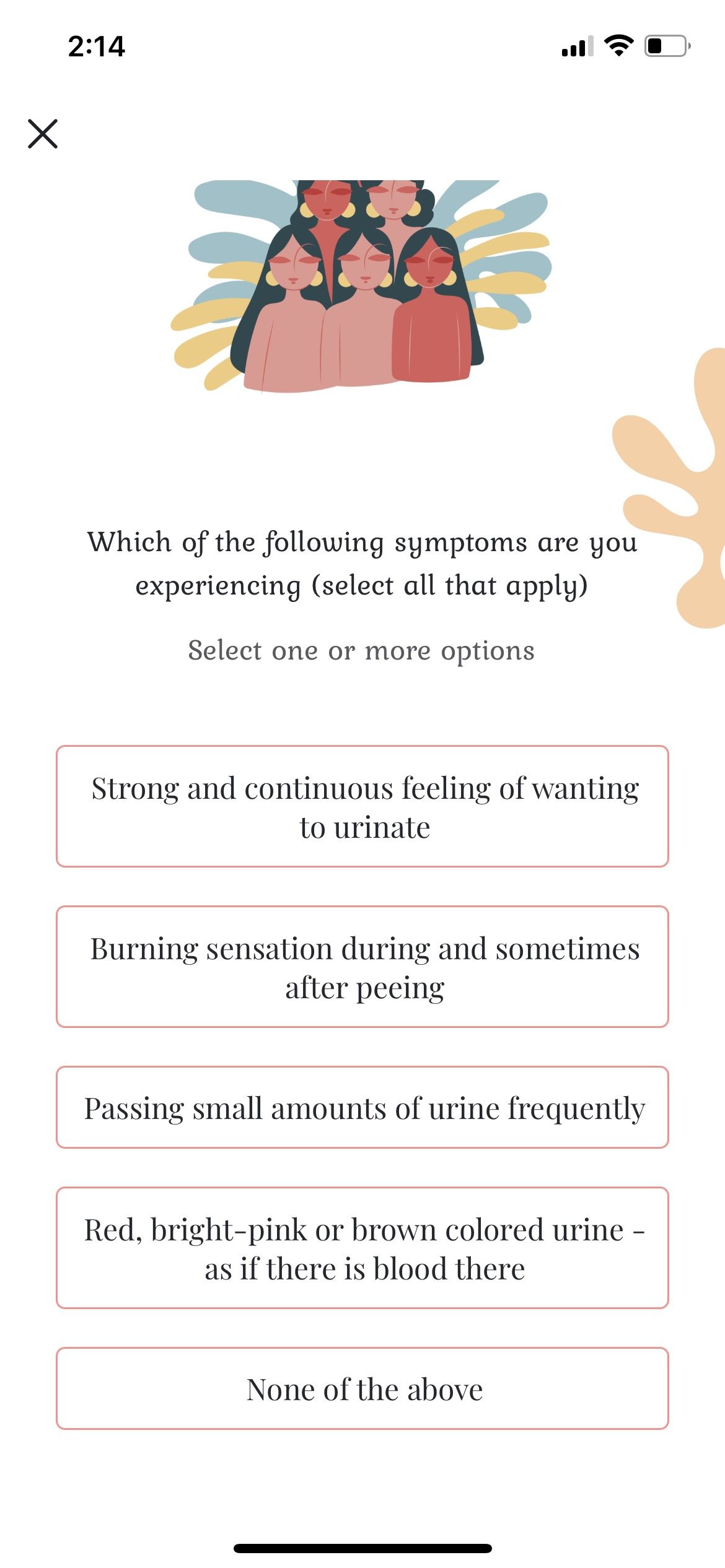There are broadly three types of urinary tract infections depending upon which part of your urinary tract is infected:
- Cystitis – infection in the bladder
- Pyelonephritis – infection in the kidneys
- Urethritis – infection in the urethra
Before getting into the details of the types of UTI, let us first understand the meaning and other significant things about UTI.
What is a urinary tract infection (UTI)?
A urinary tract infection, often known as a UTI, is an infection that affects any portion of your urinary system, including your kidneys, bladder, and urethra.
Bacteria or germs responsible for UTIs are not always seen in pee. Kidneys act as a filtration mechanism and produce urine in the form of a byproduct. Your kidneys produce urine when they remove waste items and excess water from your blood. Urine normally passes through your urinary system uncontaminated. Infections and inflammation can, however, be caused by bacteria entering the urinary system from outside the body. This bacterial infection in urine causes UTI to develop in the Urinary Tract.
What comprises the urinary tract?
The urinary tract produces and stores urine, which is one of the body’s waste products. The parts of the urinary tract are as follows:
- The kidneys are little organs placed right above the hips in the back of your body. They are your body’s filters, which remove wastes and water from your blood. This waste is transformed into urine.
- The kidneys send urine to the Urinary bladder through tiny tubes called ureters.
- The Urinary bladder is a sac-like container that retains urine before it leaves the body.
- The urethra transports urine from your bladder to the outside of your body. 1
Types of Urinary Tract Infections:
Infections can occur in several areas of the urinary tract. Each type has a distinct name depending on where it is located. The three common types of UTI along with their symptoms are as follows:
1. Cystitis (bladder): In most cases, this form of UTI is caused by Escherichia coli (E. coli), a bacteria commonly found in the gastrointestinal (GI) tract. Other bacteria, though, are sometimes responsible.
Although sexual activity can cause cystitis, it does not require active sexual behaviour. All women are at risk of cystitis due to the short distance between the urethra and the anus and the urethral entry into the bladder.
You may feel compelled to pee frequently or may experience that it hurts or burns while you pee. Lower abdominal pain and cloudy or bloody urine are also symptoms of UTI in the bladder.
2. Pyelonephritis (kidneys): Fever, chills, nausea, vomiting, and pain or discomfort in your upper back or side are all urinary tract infection symptoms of pyelonephritis (kidney infection).
3. Urethritis (urethra): When GI bacteria travel from the anus to the urethra, this form of UTI occurs. Furthermore, because the female urethra is so close to the vagina, sexually transmitted illnesses like herpes, gonorrhea, chlamydia, and mycoplasma can induce urethritis. You may notice a discharge and a burning sensation when you pee. 2 3
What is the most serious type of UTI?
Pyelonephritis is the most serious type of UTI. It is a bacterial infection of your renal tissues that causes inflammation in your kidneys. Here, the infection is further higher up from the urinary tract right upto your kidneys. It is difficult to treat, more painful and has the risk of kidney damage hence is the most dangerous type of UTI and requires the longest course of therapy. 4
What are the types of bacteria causing a UTI?
The list of five most common bacteria that can cause urinary tract infection are Escherichia coli, Klebsiella pneumoniae, Proteus mirabilis, Enterococcus faecalis, and Staphylococcus saprophyticus. 5
What are most urinary tract infections caused by?
Urinary tract infections are caused due to microorganisms (usually bacteria) which enter the urethra and bladder and produce inflammation and infection. Although a UTI most often affects the urethra and bladder, bacteria can also move farther from the ureters and infect your kidneys. E. coli is a bacteria often found in the intestines and is the major cause of bladder infection (cystitis) in more than 90% of cases. 6
What are the causes of UTI?
There are different ways to get a UTI . The bacteria that live in the vagina, genital, and anal areas may enter the urethra, travel to the bladder, and cause an infection. This could happen during sexual activity when bacteria from your partner’s genitals, anus, fingers, or sex toys get into your urethra. It may also be caused when you wipe yourself down there from back to front rather than front to back. Inadequate water intake, prolonged use of pads/napkins, unclean underwear, poor perineal hygiene may also cause UTI. UTIs can also be caused due to Sexually Transmitted infections such as chlamydia, gonorrhea, or other organisms. 7
How can you tell the difference between bladder infection and UTI?
A urinary tract infection (UTI) is an infection in one or more parts of the urinary tract—the ureters, kidneys, urethra, and bladder. A bladder infection is a UTI that occurs only in the bladder.
The symptoms of a UTI and bladder infection are generally the same, which is why people frequently use the terms interchangeably. The symptoms of a bladder infection are:
- burning when urinating (dysuria)
- feeling like you have to pee frequently, but very little urine comes out
- pelvic pain (lower abdominal pain just above the pubic bone)
If you have a UTI, you may experience additional symptoms like:
- Chills
- Fever
- Lower back pain
- Nausea and vomiting
- Pinkish or reddish urine
People having urethritis, an infection of the urethra, or the tubes that connect the bladder to the opening of the body, may also have itching, burning, pain or irritation at the end of the urethra where the urine comes out.
Treatment of Urinary tract infection depends on the severity of the infection. Doctors often tend to divide UTIs into simple and complicated UTIs. Doctors usually treat simple UTIs with antibiotics – about a three to five day course. Trimethoprim, ciprofloxacin, nitrofurantoin, norflox and amoxicillin-clavulanate potassium are some of the antibiotics used to treat bladder infections. Complicated or recurrent UTIs need a Urine test to see which bacteria is causing infection and which antibiotic it is sensitive to. Till the test results are achieved, urine alkalizers and antispasmodic pain killers may help bring some symptomatic relief. Adequate hydration and water intake play an important role in UTI treatment. Even if you feel better, you should always finish the antibiotic course if you have an infection. This prevents the UTI from coming back and helps completely cure urinary tract infections. 8
What are the diseases of the urinary system?
Some of the common urological disorders and diseases are:
A. Benign Prostatic Hyperplasia (BPH):
BPH, also known as benign prostatic hyperplasia, is an increase in the size of the prostate gland. BPH is a common condition among older men and is not directly connected to prostate cancer. The symptoms of BPH are due to the pressure that a larger prostate might put on the urethra.
Men with BPH may have a frequent urge to urinate. They may also have a weak stream of urine when they do urinate and the sensation that their bladder is not empty after peeing. Your doctor may decide to monitor the condition or treat it with medicines such as alpha-blockers. Severe cases can also be treated with surgery.
B. Urinary Incontinence:
Urinary incontinence is a loss of bladder control, which results in an unwanted leakage of urine. Although this condition might be difficult and embarrassing, it is not uncommon.
There are several reasons that can lead to Urinary incontinence. The most common reasons are:
- Diabetes
- Pregnancy or childbirth
- Overactive bladder
- Enlarged prostate in men
- Weak bladder muscles
- Weak sphincter muscles (muscles supporting the urethra)
- Urinary tract infections
- Diseases like Parkinson’s disease and multiple sclerosis
- Injury to the spinal cord
- Severe constipation
C. Kidney and Ureteral Stones:
Kidney stones are formed when the balance of minerals and wastes in the urine is affected and there are crystals in the urine, and small particles surround and collect on these crystals. However, ureteral stones are the ones that move from the kidney into the ureter (the tubes that carry urine from the kidneys to the bladder).
These stones can block urine flow and be extremely painful. Many people can eliminate small stones from their bodies without medical help, but larger stones might cause blockage, which is problematic.
In some cases, medical and surgical procedures might be necessary to remove big stones. One of the most often used procedures is extracorporeal shock wave lithotripsy (ESWL). This procedure involves using sound waves to break these stones into smaller pieces to help them exit the body easily.
What are the common urinary tract problems?
Common urinary tract problems include conditions like:
- Bladder cancer
- Bladder prolapse
- Hematuria (blood in the urine)
- Interstitial cystitis (also called painful bladder syndrome)
- Overactive bladder 9
Why won’t my UTI clear up with antibiotics?
Most UTIs are treated with antibiotics first. Doctors often prescribe an antibiotic without performing a urine culture. This is because E. coli is responsible for about 90% of UTIs, and a urine culture will almost likely confirm this.
Unfortunately, UTI treatment may not always work as expected. There are three possible causes for this:
- The UTI is due to an antibiotic-resistant strain of bacteria.
- The infection could be due to another sort of bacteria, fungi, or virus.
- The UTI could be due to another condition that shows UTI-like symptoms.
- The antibiotics you are using might not be right for you.
- It could be a sexually transmitted infection like Chlamydia or Gonorrhea
- It could be a complicated UTI like cystitis or kidney infection which can not be treated with a simple course of antibiotics
If you are experiencing UTI-like symptoms which have not responded to antibiotic treatment, your doctor might perform additional testing.10
What are the signs or symptoms of a urinary tract infection?
The lining of the urinary tract gets inflamed and red due to a urinary tract infection, which might result in some symptoms like:
- Abdominal or pelvic pain
- Frequent urge to pee
- Urine leakage
- Painful urination (dysuria)
- Blood in urine
- The abnormal colour of urine
- Foul smell in urine
- Urge to pee during the night
You might experience other symptoms like
- Pain during intercourse
- Lower back pain
- Tiredness
- Fever and chills
- Nausea
- Vomiting
- An altered or confused mental state.
If you are experiencing these symptoms, they need to be diagnosed and treated immediately as they could be complicated UTI symptoms. 11
How do you know if a UTI has spread to your kidneys?
A kidney infection is a painful and unpleasant condition frequently caused by cystitis, a common bladder infection. Most patients with cystitis do not get a kidney infection, although bacteria can occasionally move up from the bladder and into one or both kidneys. A kidney infection does not cause serious harm if treated immediately with antibiotics; however, you will feel quite unwell. If a kidney infection is left untreated, it might worsen and sometimes result in permanent kidney damage.
You may experience fever, shivering, sickness, and pain in your back or side. You may experience symptoms of a urinary tract infection (UTI), such as cystitis, like:
- Needing to urinate suddenly or more often than usual
- Pain or a burning sensation when peeing
- Smelly or cloudy urine
- Blood in your urine
Consult your doctor if you have a fever and persistent pain in your tummy, lower back, or genitals. You should also contact a doctor if your UTI symptoms do not improve after a few days or if you have blood in your urine. Your doctor will ask about your symptoms and recent medical history to determine if you have a kidney infection. They will perform a urine test to determine if you have a UTI.
Most kidney infections require immediate antibiotic treatment to prevent the infection from damaging the kidneys or spreading to the bloodstream. If you are vulnerable to the effects of an infection (for example, if you have a chronic medical condition or are pregnant), you may be admitted to the hospital and treated with intravenous antibiotics via a drip. People who are diagnosed and treated quickly with antibiotics feel better in approximately two weeks. Older people or people with underlying medical conditions may require more time to recover.12
What should you not do when you have a UTI?
Here are some of the things you should not do when you have a UTI
- Avoid consuming foods and beverages such as caffeinated coffee, caffeinated sodas, alcohol, spicy foods, acidic fruits, and artificial sweeteners. These can irritate your bladder or worsen your symptoms.
- You should avoid the delay in going to the doctor when you have a UTI. Your attempt to treat a UTI yourself allows the infection additional time to spread. Over-the-counter medications can mask the pain, but they do not kill the bacteria; you need to use antibiotics to eliminate a UTI.
- You should avoid quitting the antibiotics earlier than the prescribed course. The antibiotic prescribed to you must be in your system for the whole period to eliminate the infection. Although you might probably start to feel better after just one or two days from the start of the antibiotic treatment, that does not mean that the antibiotics have completely eliminated the infection.
- Never reduce your water intake. When the body is dehydrated, bacteria can grow in the bladder and not drinking enough water can keep your medication from penetrating your kidneys and bladder.
- Always avoid delays in urinating. You must not allow yourself to hold your urine because you think you are too busy to urinate. When you sense the urge to urinate and not urinate, you can put yourself at risk for major urinary tract issues. Retaining the urine also allows the bacteria in your bladder to remain there, and emptying the bladder will quickly flush out bacteria. 13
Download the Pinky Promise app to connect with a friendly and highly qualified gynaecologist and clear all your doubts and get customised solutions for your urinary discomfort issues at just ₹59/- Also get confidential pathology tests done at the comfort of your home. Pinky Promise app has a gynaecologist-verified chatbot wherein you can get an understanding of your symptoms instantly by answering simple questions. You can also connect anonymously to thousands of women on our chatrooms for FREE!






